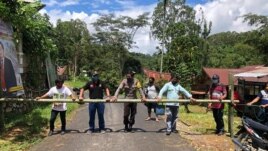13 May 2020
In eastern Indonesia, cut trees block a road that leads to Papuan villages. Along Thailand's border with Myanmar, the Karen people have put up signs warning visitors to stay away.
Around the world, the coronavirus pandemic has left indigenous peoples at risk because so many are in poor health. Indigenous groups also have few doctors available to treat them in their communities, mostly rural areas.
There are, naturally, large differences among these native peoples, including diet and socioeconomic conditions. The United Nations estimates that the life expectancy of indigenous people can be up to 20 years lower than that of other people.

In this April 24, 2020, photo, provided by the Indigenous People Alliance of the Archipelago, indigenous peoples from the Buntao' community in Indonesia's North Toraja regency in South Sulawesi Province use a wooden barrier to block off their village. (AMAN via AP)
Australia's government has noted how large the differences can be. In March, the government warned that "Indigenous people aged over 50 should stay home whenever possible for their own protection." The age was 10 to 20 years higher for other population groups.
The strong guidance for indigenous people is likely because so many have the kinds of health issues that can lead to serious problems if they get the coronavirus.
United Nations records state that more than half of indigenous adults over 35 around the world have Type 2 diabetes. They also have higher levels of heart problems, the virus that causes AIDS, and diseases such as tuberculosis.
Genetics may be part of the reason for poor health among indigenous people, says Mason Durie. He is a professor of Māori Studies at Massey University in Australia. Durie himself is also Maori. He believes the true reason, however, are social conditions, such as poverty and a lack of education.
Many indigenous people are now cutting themselves off from the world, says Rudolph Rÿser. He is an indigenous activist and head of the Center for World Indigenous Studies.
"They simply closed down...and block the roads going into their territories," he said.
But that creates another problem: indigenous people returning to their villages from cities might bring the coronavirus with them.
And some villages, such as the aboriginal ones in Australia, are not prepared to fight the virus. There is crowding in many homes and poor public services, said Mark Wenitong. He is an aboriginal doctor and serves as adviser to aboriginal health organizations in Australia.
Indigenous people were already struggling to keep their traditions and hold out against the modern world. The people of the Amazon rainforest have long fought off miners and farmers, who have begun to work the land around them.
Social restrictions put in place to contain the pandemic are also threatening the way of life of some groups.
In Uganda, the Batwa people are facing food shortages because of stay-at-home orders. The military is trying to stop them from moving across the border into Rwanda, explains Faith Tushabe. She works with a local aid group. The Batwa usually trade work for food, but they cannot do that now.
The Maasai are a semi-nomadic indigenous people in Kenya and Tanzania. They have been forced to stop important celebrations that bring different groups together to discuss issues of property or marriage.
The coronavirus pandemic is forcing major changes, said Benyamin Timaiyio, a Maasai youth leader.
"It will totally interfere with culture and tradition — and we are living through culture and tradition," he said.
I'm Susan Shand.
The Associated Press reported this story. Susan Shand adapted it for Learning English. George Grow was the editor.
________________________________________________________________
Words in This Story
pandemic - n. a contagious illness that spreads among countries
indigenous - adj. a region's original people
Type 2 diabetes - n. a serious disease in which the body cannot properly control the amount of sugar in your blood because it does not have enough insulin, often associated with poor nutrition and poverty
poverty - n. without money, poor
aboriginal - n. of or relating to the native people of Australia
semi-nomadic - adj. people who move from place to place